
Former Vice President Al Gore gives the keynote address during the National Clean Energy Summit 9.0 at the Bellagio on Friday, Oct. 13, 2017.
Friday, Oct. 13, 2017 | 12:22 p.m.
Related Coverage
As wildfires burn in California and communities recover from massive hurricanes, environmental leaders opened the ninth annual National Clean Energy Summit in Las Vegas.
Former Vice President Al Gore spoke to attendees about the work still to be done to continue stabilizing and bringing down pollution.
Gov. Jerry Brown was slated to attend the conference, but wildfires kept him in California and have led to 31 deaths.
“All over the West we’re seeing these fires get much, much worse,” Gore said, noting that a number of factors contribute to this. “The underlying cause is the heat.”
MGM Resorts International CEO Jim Murren opened the conference, speaking about the community’s strength in the wake of the Oct. 1 massacre on the Las Vegas Strip. He introduced Gov. Brian Sandoval, who also spoke about the city’s resilience and said Las Vegas is the perfect place to hold the summit.
“You all know about us as being the entertainment capital of the world, but we’re also an international trailblazer in clean and renewable energy,” Sandoval said. “The Silver State is committed to staying on the cutting edge when it comes to renewable energy development, production and usage.”
Sandoval introduced former Nevada U.S. Sen. Harry Reid at the summit, who spoke about the decades of work that has been done when it comes to climate change. Reid, a Democrat, called Sandoval a “good Republican” and said the governor was always willing to listen.
Reid said he likes to drive by an array of 4 million solar panels on the way to Searchlight.
“That is something to see,” Reid said. “Creating, as the governor mentioned, thousands and thousands of jobs to put those in place. It takes a lot of work, a lot of expertise, but they’re there.”
He said the energy sector is strong thanks to natural resources, modern infrastructure and tax incentives that attract energy developers. Since 2011, private investments in clean energy have skyrocketed, he said.
“We have invested $734 million in incentives,” Sandoval said. “I’m the first to acknowledge that’s a big investment, but that has attracted a return of $7 billion.”
Sandoval said renewable energy production in the state has almost doubled since 2009. The state ranks first in solar geothermal energy per capita. He mentioned companies doing work in renewable energy, such as MGM, Tesla, Apple and Switch.
“They’re doing it not just because it’s good for the environment but because it makes good financial sense to do so,” he said.
Sandoval said the state Legislature racked up several accomplishments this session with regard to generation, storage, consumption, exportation and consumer protections.
The state rebooted its net metering program, a system that gives power customers credit for excess energy they put back into the grid and tends to lead to lower utility bills, an incentive for residents who are exploring installing solar panels.
“We’ve created a very vibrant and exciting industry that is serving as a model for many other states,” Sandoval said. “I understand as I stand here today there’s a lot more to do, and we’re going to continue, at least as long as I’m here, to encourage clean energy in Nevada.”
Reid then brought Gore up, saying they’d worked together in the U.S. House and Senate. Gore said the three questions people need to ask are: Do we need to change? Can we change? And will we change? He said he believes the answer to all three is yes.
Gore said carbon dioxide from burning fossil fuels is the heart of the problem, along with other factors, in warming the world and melting glaciers. He said that as temperatures rise, water evaporates from the ocean, intensifying hurricanes and leading to drought in other parts of the world. He said this can have environmental, economic and political impacts. Three recent hurricanes have caused an estimated $350 billion in losses.
“The heart of it is that we still depend on fossil fuels,” Gore said.
He said the lower cost of renewable energy is spurring growth. Even though President Donald Trump has said the U.S. is pulling out of the Paris Climate Agreement, Gore said, the first day that could actually happen isn’t until the next presidential term. Even so, many states and businesses have said they still intend to pursue the goals set out in the agreement.
U.S. subsidies for fossil fuels are 26 times larger than subsidies for renewables, and now the plan is to increase that disparity even further, Gore said.
“We need to save our common home,” he said.

